初中英语拓展阅读(1)培训资料
- 格式:doc
- 大小:44.50 KB
- 文档页数:5
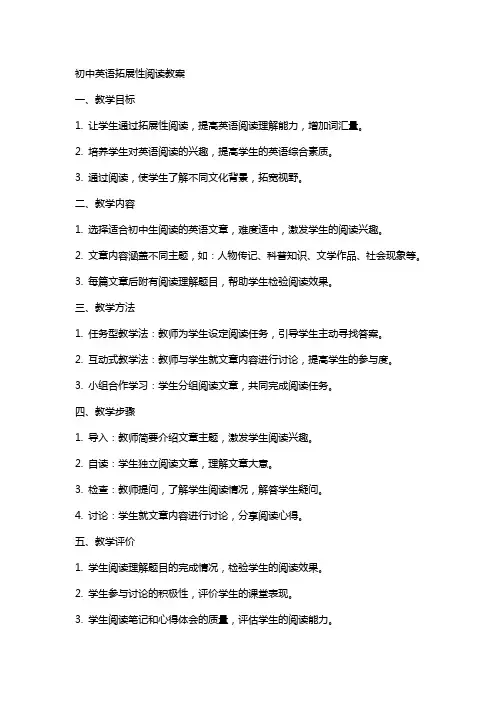
初中英语拓展性阅读教案一、教学目标1. 让学生通过拓展性阅读,提高英语阅读理解能力,增加词汇量。
2. 培养学生对英语阅读的兴趣,提高学生的英语综合素质。
3. 通过阅读,使学生了解不同文化背景,拓宽视野。
二、教学内容1. 选择适合初中生阅读的英语文章,难度适中,激发学生的阅读兴趣。
2. 文章内容涵盖不同主题,如:人物传记、科普知识、文学作品、社会现象等。
3. 每篇文章后附有阅读理解题目,帮助学生检验阅读效果。
三、教学方法1. 任务型教学法:教师为学生设定阅读任务,引导学生主动寻找答案。
2. 互动式教学法:教师与学生就文章内容进行讨论,提高学生的参与度。
3. 小组合作学习:学生分组阅读文章,共同完成阅读任务。
四、教学步骤1. 导入:教师简要介绍文章主题,激发学生阅读兴趣。
2. 自读:学生独立阅读文章,理解文章大意。
3. 检查:教师提问,了解学生阅读情况,解答学生疑问。
4. 讨论:学生就文章内容进行讨论,分享阅读心得。
五、教学评价1. 学生阅读理解题目的完成情况,检验学生的阅读效果。
2. 学生参与讨论的积极性,评价学生的课堂表现。
3. 学生阅读笔记和心得体会的质量,评估学生的阅读能力。
六、教学策略1. 引入图片、视频等多媒体资源,增强阅读材料的趣味性。
2. 提供词汇辅助工具,如词典、电子翻译软件等,帮助学生克服阅读障碍。
3. 定期举办阅读分享会,鼓励学生展示自己的阅读成果。
4. 结合课程内容,设计与文章相关的写作任务,提高学生的综合运用能力。
七、教学资源1. 英语原著书籍、简易英语读物、英语杂志、英语新闻等。
2. 网络资源,如英语学习网站、在线英语阅读平台等。
3. 英语学习软件,如英语听力、阅读APP等。
4. 英语阅读资料包,包含各类文章、阅读理解题目及答案解析。
八、教学进度安排1. 每周安排一节拓展性阅读课,保证学生有足够的时间进行阅读和讨论。
2. 每节课阅读一篇篇文章,确保学生充分理解和吸收文章内容。
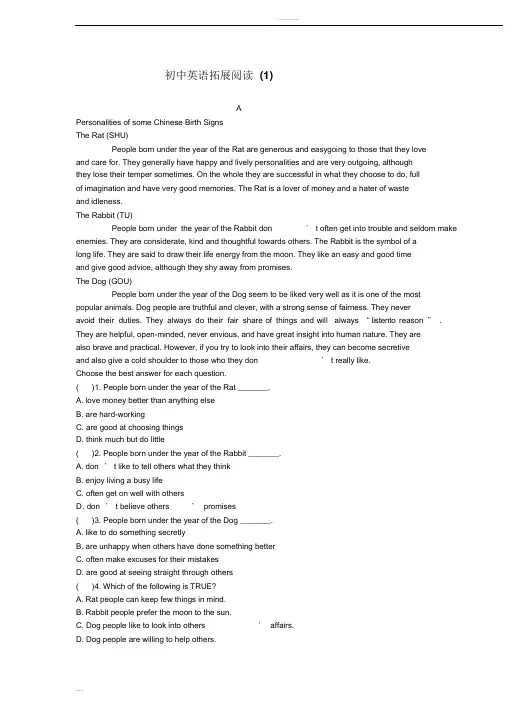
初中英语拓展阅读(1)APersonalities of some Chinese Birth SignsThe Rat (SHU)People born under the year of the Rat are generous and easygoing to those that they loveand care for. They generally have happy and lively personalities and are very outgoing, althoughthey lose their temper sometimes. On the whole they are successful in what they choose to do, fullof imagination and have very good memories. The Rat is a lover of money and a hater of wasteand idleness.The Rabbit (TU)People born under the year of the Rabbit don ’t often get into trouble and seldom make enemies. They are considerate, kind and thoughtful towards others. The Rabbit is the symbol of along life. They are said to draw their life energy from the moon. They like an easy and good timeand give good advice, although they shy away from promises.The Dog (GOU)People born under the year of the Dog seem to be liked very well as it is one of the mostpopular animals. Dog people are truthful and clever, with a strong sense of fairness. They neveravoid their duties. They always do their fair share of things and will always “listento reason ” . They are helpful, open-minded, never envious, and have great insight into human nature. They arealso brave and practical. However, if you try to look into their affairs, they can become secretiveand also give a cold shoulder to those who they don ’t really like.Choose the best answer for each question.( )1. People born under the year of the Rat _______.A. love money better than anything elseB. are hard-workingC. are good at choosing thingsD. think much but do little( )2. People born under the year of the Rabbit _______.A. don ’t like to tell others what they thinkB. enjoy living a busy lifeC. often get on well with othersD. don ’t believe others ’promises( )3. People born under the year of the Dog _______.A. like to do something secretlyB. are unhappy when others have done something betterC. often make excuses for their mistakesD. are good at seeing straight through others( )4. Which of the following is TRUE?A. Rat people can keep few things in mind.B. Rabbit people prefer the moon to the sun.C. Dog people like to look into others ’affairs.D. Dog people are willing to help others.( )5. What kind of people will not show their dissatisfaction to others?A. Rat people.B. Rabbit people.C. Dog people.D. All the above.Help: personality n. 个性generous adj. 慷慨的lose one’s temper 发脾气idleness n. 懒惰;闲散considerate adj. 考虑周到的shy away from 躲避;羞于listen to reason v. 服理envious adj. 嫉妒的insight n. 洞察力dissatisfaction n. 不满BIf you ’re having difficulties in class and it seems that your teacher is unfair to you, takesome time to think hard about what ’h s appening. Try to find out whether your teacher reallydislikes you, or whether something else is going on. Here are some questions to ask yourself:1. Are you the only person being treated badly, or is your teacher rough on the wholeclass? Ask your classmates if they are having trouble with the teacher, too. If they say yes, perhapsyour teacher is having problems outside the school, or is new and at a loss.2. Are you working up to your ability? Maybe you got a C in your last test, and yourteacher told you that you could do better. But the kid sitting beside you got a C, too, and theteacher didn ’t say anything to him! Isn ’t this unfair? Well, it could be that your teacher knows that you could get a better grade if you put more effort into it. Teachers often grade students bydifferent standards. It ’s their way of encouraging a student to try a little harder.3. Are you more sensitive than other students? There ’nsothing wrong with beingsensitive, but if you react to criticism quite differently from others, this could be a reason why youthink your teacher doesn ’t like you.4. Does your teacher seem to act unfairly all the time, or just once in a while? Think about theharsh things your teacher has done or said to you. Are these things happening every day, or justonce or twice a month? If your teacher really hates you, you would probably be picked on all thetime. If your teacher has acted unfairly only a few times, then there ’prsobably something elsegoing on.If you take the time to ask yourself these questions, you ’ll get a better sense of what ’ s happening between you and your teacher.Choose the best answer for each question.( )6. If you feel your teacher is unfair to you, you should _______.A. work harder at your lessonsB. care nothing for itC. ask your classmates for helpD. make it clear if this is true( )7. Which of the following is TRUE?A. Teachers are often rough on the students who get a C grade.B. If a teacher hates you, he will criticize you once or twice a month.C. A new teacher is often rough on the whole class.D. Sometimes your teacher criticizes you to make you work harder.( )8. If you find your teacher only treats you badly all the time, maybe _______.A. he has problems outside the schoolB. he really dislikes youC. he is more sensitive than other teachersD. he is new and wants to have some experience( )9. What does the underlined word “it ”in the third paragraph mean?A. Your ability.B. A C grade.C. Your study.D. Your teacher.( )10. What ’s the best title for this passage?A. Is your teacher really unfair to you?B. How to get on with your teachersC. Know more about your teachers!D. How to get a better sense in schoolHelp: rough adj. 粗暴的at a loss 不知所措standard n. 标准sensitive adj. 敏感的react v. 反应criticism n. 批评harsh adj. 苛刻的pick on 故意刁难;挑剔CWhat will you do to make sure you reach your goals? There are three main steps to get towhere you want to go.First, sit down and write your dreams out. By writing them you will get a better idea ofwhere you really want to go. Imagine yourself at the end of the year or maybe in five years. Whatdo you see? How do people see you? What are you doing? Are you successful?Well, a dream is just that. It ’svaision of how you see yourself in the future. Once youknow the direction in which you want to go, you can begin working on some goals.Second come the goals. Goals are “wants ”. So are dreams, but goals are more specific. Ifyou want to be rich, tell how much money you need to be rich. If you want good grades, tell whatyou mean by “good ”In. fact, the more specific the goal is, the easier it w ill be to get it. Givenumbers and times. Don ’t use words like “lots ”or “more”. For example, I want a “B”my subjects.Third are the objectives. They tell exactly what you will do and when you will do it.When you think about what you will do, don’utse words like “try o”r “maybe”B e.sure yourobjectives can be measured. Every day or every week you can say, “Did I do this? ”and youanswer with either a yes or a no. Don ’t leave room for “maybes”.OK. Here is another example. I say I want a “B”in each subject. My objectives are:I will go to every class every day.I will sit in the middle of the classroom.I will re-read my notes from every class every day.I will finish every assignment the day when it is given.Well, you get the idea. Each of my objectives is specific and each one can be measured. If Ido all these things, there is a pretty good chance for me to get what I want, which means I fulfillmy dream.Fill in the blanks with proper words according to the passage.5. The writer advises you to write your _______ out so that you can get a better idea of whereyou really want to go.6. Dreams are not so _______ as goals.7. _______ tell exactly what to do and when to do it.8. “I want to learn more English in the future ”is a dream, while “I want to go to the English Department of Wuhan University ”is a _______.9. Most of the objectives should be fulfilled every _______ according to the second example.Help: vision n. 想象;幻想specific adj. 详细的;明确的objective n. ( 客观的)目标measure v. 测量;估量assignment n. 任务;作业fulfill v. 实现Key: 1-5 BCDDB 6-10 DDBCA11. dreams 12. specific 13. Objectives 14. goal 15. day。
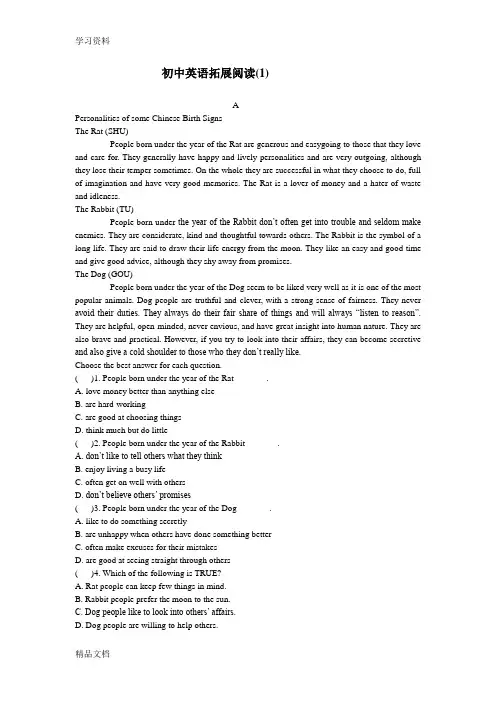
初中英语拓展阅读(1)APersonalities of some Chinese Birth SignsThe Rat (SHU)People born under the year of the Rat are generous and easygoing to those that they love and care for. They generally have happy and lively personalities and are very outgoing, although they lose their temper sometimes. On the whole they are successful in what they choose to do, full of imagination and have very good memories. The Rat is a lover of money and a hater of waste and idleness.The Rabbit (TU)People born under the year of the Rabbit don’t often get into trouble and seldom make enemies. They are considerate, kind and thoughtful towards others. The Rabbit is the symbol of a long life. They are said to draw their life energy from the moon. They like an easy and good time and give good advice, although they shy away from promises.The Dog (GOU)People born under the year of the Dog seem to be liked very well as it is one of the most popular animals. Dog people are truthful and clever, with a strong sense of fairness. They never avoid their duties. They always do their fair share of things and will always “listen to reason”. They are helpful, open-minded, never envious, and have great insight into human nature. They are also brave and practical. However, if you try to look into their affairs, they can become secretive and also give a cold shoulder to those who they don’t really like.Choose the best answer for each question.( )1. People born under the year of the Rat _______.A. love money better than anything elseB. are hard-workingC. are good at choosing thingsD. think much but do little( )2. People born under the year of the Rabbit _______.A. don’t like to tell others what they thinkB. enjoy living a busy lifeC. often get on well with othersD. don’t believe others’ promises( )3. People born under the year of the Dog _______.A. like to do something secretlyB. are unhappy when others have done something betterC. often make excuses for their mistakesD. are good at seeing straight through others( )4. Which of the following is TRUE?A. Rat people can keep few things in mind.B. Rabbit people prefer the moon to the sun.C. Dog people like to look into others’ affairs.D. Dog people are willing to help others.( )5. What kind of people will not show their dissatisfaction to others?A. Rat people.B. Rabbit people.C. Dog people.D. All the above.Help: personality n. 个性generous adj. 慷慨的lose one’s temper 发脾气idleness n. 懒惰;闲散considerate adj. 考虑周到的shy away from 躲避;羞于listen to reason v. 服理envious adj. 嫉妒的insight n. 洞察力dissatisfaction n. 不满BIf you’re having difficulties in class and it seems that your teacher is unfair to you, take some time to think hard about what’s happening. Try to find out whether your teacher really dislikes you, or whether something else is going on. Here are some questions to ask yourself:1. Are you the only person being treated badly, or is your teacher rough on the whole class? Ask your classmates if they are having trouble with the teacher, too. If they say yes, perhaps your teacher is having problems outside the school, or is new and at a loss.2. Are you working up to your ability? Maybe you got a C in your last test, and your teacher told you that you could do better. But the kid sitting beside you got a C, too, and the teacher didn’t say anything to him! Isn’t this unfair? Well, it could be that your teacher knows that you could get a better grade if you put more effort into it. Teachers often grade students by different standards. It’s their way of encouraging a student to try a little harder.3. Are you more sensitive than other students? There’s nothing wrong with being sensitive, but if you react to criticism quite differently from others, this could be a reason why you think your teacher doesn’t like you.4. Does your teacher seem to act unfairly all the time, or just once in a while? Think about the harsh things your teacher has done or said to you. Are these things happening every day, or just once or twice a month? If your teacher really hates you, you would probably be picked on all the time. If your teacher has acted unfairly only a few times, then there’s probably something else going on.If y ou take the time to ask yourself these questions, you’ll get a better sense of what’s happening between you and your teacher.Choose the best answer for each question.( )6. If you feel your teacher is unfair to you, you should _______.A. work harder at your lessonsB. care nothing for itC. ask your classmates for helpD. make it clear if this is true( )7. Which of the following is TRUE?A. Teachers are often rough on the students who get a C grade.B. If a teacher hates you, he will criticize you once or twice a month.C. A new teacher is often rough on the whole class.D. Sometimes your teacher criticizes you to make you work harder.( )8. If you find your teacher only treats you badly all the time, maybe _______.A. he has problems outside the schoolB. he really dislikes youC. he is more sensitive than other teachersD. he is new and wants to have some experience( )9. What does the underlined word “it” in the third paragraph mean?A. Your ability.B. A C grade.C. Your study.D. Your teacher.( )10. What’s the best title for this passage?A. Is your teacher really unfair to you?B. How to get on with your teachersC. Know more about your teachers!D. How to get a better sense in schoolHelp: rough adj. 粗暴的at a loss 不知所措standard n. 标准sensitive adj. 敏感的react v. 反应criticism n. 批评harsh adj. 苛刻的pick on 故意刁难;挑剔CWhat will you do to make sure you reach your goals? There are three main steps to get to where you want to go.First, sit down and write your dreams out. By writing them you will get a better idea of where you really want to go. Imagine yourself at the end of the year or maybe in five years. What do you see? How do people see you? What are you doing? Are you successful?Well, a dream is just that. It’s a vision of how you see yourself in the future. Once you know the direction in which you want to go, you can begin working on some goals.Secon d come the goals. Goals are “wants”. So are dreams, but goals are more specific. If you want to be rich, tell how much money you need to be rich. If you want good grades, tell what you mean by “good”. In fact, the more specific the goal is, the easier it w ill be to get it. Give numbers and times. Don’t use words like “lots” or “more”. For example, I want a “B” in each of my subjects.Third are the objectives. They tell exactly what you will do and when you will do it. When you think about what you will do, don’t use words like “try” or “maybe”. Be sure your objectives can be measured. Every day or every week you can say, “Did I do this?” and you can answer with either a yes or a no. Don’t leave room for “maybes”.OK. Here is another example. I say I want a “B” in each subject. My objectives are:I will go to every class every day.I will sit in the middle of the classroom.I will re-read my notes from every class every day.I will finish every assignment the day when it is given.Well, you get the idea. Each of my objectives is specific and each one can be measured. If Ido all these things, there is a pretty good chance for me to get what I want, which means I’ll fulfill my dream.Fill in the blanks with proper words according to the passage.11. The writer advises you to write your _______ out so that you can get a better idea of where you really want to go.12. Dreams are not so _______ as goals.13. _______ tell exactly what to do and when to do it.14. “I want to learn more English in the future” is a dream, while “I want to go to the English Department of Wuhan University” is a _______.15. Most of the objectives should be fulfilled every _______ according to the second example. Help: vision n. 想象;幻想specific adj. 详细的;明确的objective n. (客观的)目标measure v. 测量;估量assignment n. 任务;作业fulfill v. 实现Key: 1-5 BCDDB 6-10 DDBCA11. dreams 12. specific 13. Objectives 14. goal 15. day。
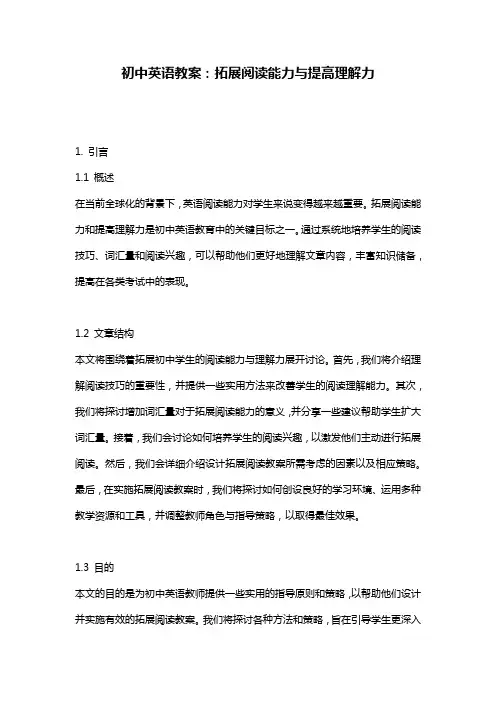
初中英语教案:拓展阅读能力与提高理解力1. 引言1.1 概述在当前全球化的背景下,英语阅读能力对学生来说变得越来越重要。
拓展阅读能力和提高理解力是初中英语教育中的关键目标之一。
通过系统地培养学生的阅读技巧、词汇量和阅读兴趣,可以帮助他们更好地理解文章内容,丰富知识储备,提高在各类考试中的表现。
1.2 文章结构本文将围绕着拓展初中学生的阅读能力与理解力展开讨论。
首先,我们将介绍理解阅读技巧的重要性,并提供一些实用方法来改善学生的阅读理解能力。
其次,我们将探讨增加词汇量对于拓展阅读能力的意义,并分享一些建议帮助学生扩大词汇量。
接着,我们会讨论如何培养学生的阅读兴趣,以激发他们主动进行拓展阅读。
然后,我们会详细介绍设计拓展阅读教案所需考虑的因素以及相应策略。
最后,在实施拓展阅读教案时,我们将探讨如何创设良好的学习环境、运用多种教学资源和工具,并调整教师角色与指导策略,以取得最佳效果。
1.3 目的本文的目的是为初中英语教师提供一些实用的指导原则和策略,以帮助他们设计并实施有效的拓展阅读教案。
我们将探讨各种方法和策略,旨在引导学生更深入地理解英语阅读材料,并提高他们的阅读能力与理解力。
通过本文所提供的建议和提示,希望能够激发教师们对于拓展阅读教育的思考,促进教育改革与创新,在营造积极有益的英语学习环境中,培养出更多具有出色阅读与理解能力的学生。
2. 拓展阅读能力与提高理解力2.1 理解阅读技巧拓展阅读能力的关键是提高理解力,学生需要掌握一些有效的阅读技巧。
首先,他们应该学会预测故事情节和推测词义。
通过观察上下文并利用已有的词汇知识,学生可以猜测出不熟悉的单词或句子的含义。
其次,学生需要注意文章中的关键信息,如人物名字、时间地点等,并理解它们在整个故事中的作用和关系。
此外,学生还应该培养区分重要细节和次要细节的能力,从而更好地理解文章的主旨。
2.2 增加词汇量为了更好地理解拓展阅读材料,学生需要不断扩大自己的词汇量。
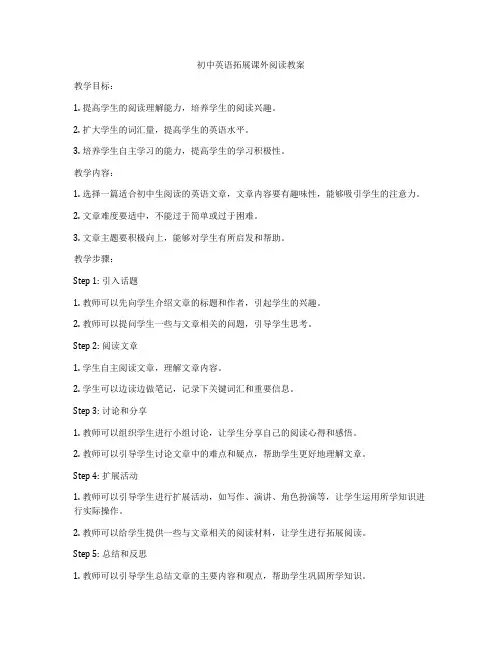
初中英语拓展课外阅读教案教学目标:1. 提高学生的阅读理解能力,培养学生的阅读兴趣。
2. 扩大学生的词汇量,提高学生的英语水平。
3. 培养学生自主学习的能力,提高学生的学习积极性。
教学内容:1. 选择一篇适合初中生阅读的英语文章,文章内容要有趣味性,能够吸引学生的注意力。
2. 文章难度要适中,不能过于简单或过于困难。
3. 文章主题要积极向上,能够对学生有所启发和帮助。
教学步骤:Step 1: 引入话题1. 教师可以先向学生介绍文章的标题和作者,引起学生的兴趣。
2. 教师可以提问学生一些与文章相关的问题,引导学生思考。
Step 2: 阅读文章1. 学生自主阅读文章,理解文章内容。
2. 学生可以边读边做笔记,记录下关键词汇和重要信息。
Step 3: 讨论和分享1. 教师可以组织学生进行小组讨论,让学生分享自己的阅读心得和感悟。
2. 教师可以引导学生讨论文章中的难点和疑点,帮助学生更好地理解文章。
Step 4: 扩展活动1. 教师可以引导学生进行扩展活动,如写作、演讲、角色扮演等,让学生运用所学知识进行实际操作。
2. 教师可以给学生提供一些与文章相关的阅读材料,让学生进行拓展阅读。
Step 5: 总结和反思1. 教师可以引导学生总结文章的主要内容和观点,帮助学生巩固所学知识。
2. 教师可以反思本次阅读活动的效果,找出不足之处,为下一次活动做好准备。
教学评价:1. 观察学生在阅读过程中的表现,如阅读速度、阅读理解能力等。
2. 听取学生的反馈意见,了解学生的学习需求和兴趣。
3. 通过学生的扩展活动成果,评估学生的学习效果。
注意事项:1. 教师要关注学生的个体差异,给予不同水平的学生不同的指导和帮助。
2. 教师要鼓励学生积极参与阅读活动,培养学生的阅读习惯。
3. 教师要注重阅读材料的筛选,确保文章的质量。
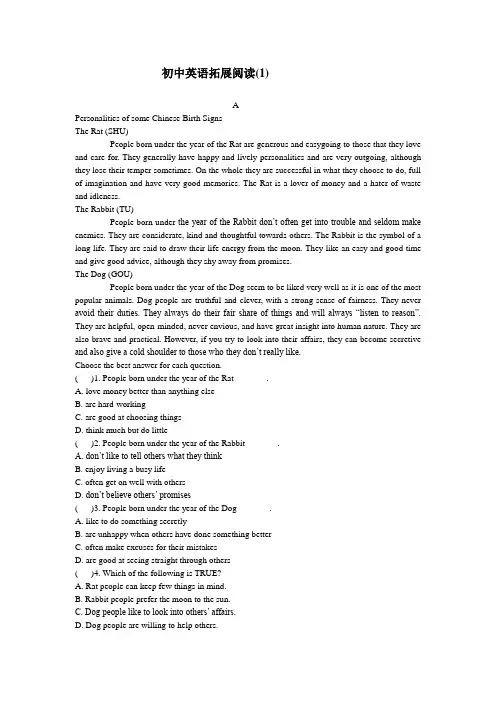
初中英语拓展阅读(1)APersonalities of some Chinese Birth SignsThe Rat (SHU)People born under the year of the Rat are generous and easygoing to those that they love and care for. They generally have happy and lively personalities and are very outgoing, although they lose their temper sometimes. On the whole they are successful in what they choose to do, full of imagination and have very good memories. The Rat is a lover of money and a hater of waste and idleness.The Rabbit (TU)People born under the year of the Rabbit don’t often get into trouble and seldom make enemies. They are considerate, kind and thoughtful towards others. The Rabbit is the symbol of a long life. They are said to draw their life energy from the moon. They like an easy and good time and give good advice, although they shy away from promises.The Dog (GOU)People born under the year of the Dog seem to be liked very well as it is one of the most popular animals. Dog people are truthful and clever, with a strong sense of fairness. They never avoid their duties. They always do their fair share of things and will always “listen to reason”. They are helpful, open-minded, never envious, and have great insight into human nature. They are also brave and practical. However, if you try to look into their affairs, they can become secretive and also give a cold shoulder to those who they don’t really like.Choose the best answer for each question.( )1. People born under the year of the Rat _______.A. love money better than anything elseB. are hard-workingC. are good at choosing thingsD. think much but do little( )2. People born under the year of the Rabbit _______.A. don’t like to tell others what they thinkB. enjoy living a busy lifeC. often get on well with othersD. don’t believe others’ promises( )3. People born under the year of the Dog _______.A. like to do something secretlyB. are unhappy when others have done something betterC. often make excuses for their mistakesD. are good at seeing straight through others( )4. Which of the following is TRUE?A. Rat people can keep few things in mind.B. Rabbit people prefer the moon to the sun.C. Dog people like to look into others’ affairs.D. Dog people are willing to help others.( )5. What kind of people will not show their dissatisfaction to others?A. Rat people.B. Rabbit people.C. Dog people.D. All the above.Help: personality n. 个性generous adj. 慷慨的lose one’s temper 发脾气idleness n. 懒惰;闲散considerate adj. 考虑周到的shy away from 躲避;羞于listen to reason v. 服理envious adj. 嫉妒的insight n. 洞察力dissatisfaction n. 不满BIf you’re having difficulties in class and it seems that your teacher is unfair to you, take some time to think hard about what’s happening. Try to find out whether your teacher really dislikes you, or whether something else is going on. Here are some questions to ask yourself:1. Are you the only person being treated badly, or is your teacher rough on the whole class? Ask your classmates if they are having trouble with the teacher, too. If they say yes, perhaps your teacher is having problems outside the school, or is new and at a loss.2. Are you working up to your ability? Maybe you got a C in your last test, and your teacher told you that you could do better. But the kid sitting beside you got a C, too, and the teacher didn’t say anything to him! Isn’t this unfair? Well, it could be that your teacher knows that you could get a better grade if you put more effort into it. Teachers often grade students by different standards. It’s their way of encouraging a student to try a little harder.3. Are you more sensitive than other students? There’s nothing wrong with being sensitive, but if you react to criticism quite differently from others, this could be a reason why you think your teacher doesn’t like you.4. Does your teacher seem to act unfairly all the time, or just once in a while? Think about the harsh things your teacher has done or said to you. Are these things happening every day, or just once or twice a month? If your teacher really hates you, you would probably be picked on all the time. If your teacher has acted unfairly only a few times, then there’s probably something else going on.If y ou take the time to ask yourself these questions, you’ll get a better sense of what’s happening between you and your teacher.Choose the best answer for each question.( )6. If you feel your teacher is unfair to you, you should _______.A. work harder at your lessonsB. care nothing for itC. ask your classmates for helpD. make it clear if this is true( )7. Which of the following is TRUE?A. Teachers are often rough on the students who get a C grade.B. If a teacher hates you, he will criticize you once or twice a month.C. A new teacher is often rough on the whole class.D. Sometimes your teacher criticizes you to make you work harder.( )8. If you find your teacher only treats you badly all the time, maybe _______.A. he has problems outside the schoolB. he really dislikes youC. he is more sensitive than other teachersD. he is new and wants to have some experience( )9. What does the underlined word “it” in the third paragraph mean?A. Your ability.B. A C grade.C. Your study.D. Your teacher.( )10. What’s the best title for this passage?A. Is your teacher really unfair to you?B. How to get on with your teachersC. Know more about your teachers!D. How to get a better sense in schoolHelp: rough adj. 粗暴的at a loss 不知所措standard n. 标准sensitive adj. 敏感的react v. 反应criticism n. 批评harsh adj. 苛刻的pick on 故意刁难;挑剔CWhat will you do to make sure you reach your goals? There are three main steps to get to where you want to go.First, sit down and write your dreams out. By writing them you will get a better idea of where you really want to go. Imagine yourself at the end of the year or maybe in five years. What do you see? How do people see you? What are you doing? Are you successful?Well, a dream is just that. It’s a vision of how you see yourself in the future. Once you know the direction in which you want to go, you can begin working on some goals.Secon d come the goals. Goals are “wants”. So are dreams, but goals are more specific. If you want to be rich, tell how much money you need to be rich. If you want good grades, tell what you mean by “good”. In fact, the more specific the goal is, the easier it w ill be to get it. Give numbers and times. Don’t use words like “lots” or “more”. For example, I want a “B” in each of my subjects.Third are the objectives. They tell exactly what you will do and when you will do it. When you think about what you will do, don’t use words like “try” or “maybe”. Be sure your objectives can be measured. Every day or every week you can say, “Did I do this?” and you can answer with either a yes or a no. Don’t leave room for “maybes”.OK. Here is another example. I say I want a “B” in each subject. My objectives are:I will go to every class every day.I will sit in the middle of the classroom.I will re-read my notes from every class every day.I will finish every assignment the day when it is given.Well, you get the idea. Each of my objectives is specific and each one can be measured. If Ido all these things, there is a pretty good chance for me to get what I want, which means I’ll fulfill my dream.Fill in the blanks with proper words according to the passage.11. The writer advises you to write your _______ out so that you can get a better idea of where you really want to go.12. Dreams are not so _______ as goals.13. _______ tell exactly what to do and when to do it.14. “I want to learn more English in the future” is a dream, while “I want to go to the English Department of Wuhan University” is a _______.15. Most of the objectives should be fulfilled every _______ according to the second example. Help: vision n. 想象;幻想specific adj. 详细的;明确的objective n. (客观的)目标measure v. 测量;估量assignment n. 任务;作业fulfill v. 实现Key: 1-5 BCDDB 6-10 DDBCA11. dreams 12. specific 13. Objectives 14. goal 15. day。
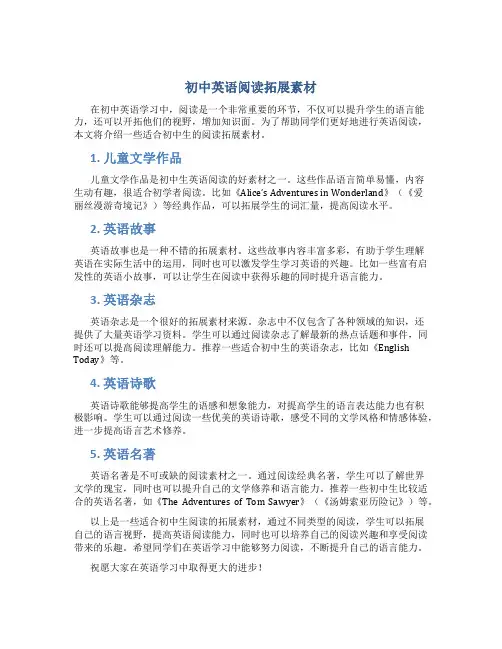
初中英语阅读拓展素材在初中英语学习中,阅读是一个非常重要的环节,不仅可以提升学生的语言能力,还可以开拓他们的视野,增加知识面。
为了帮助同学们更好地进行英语阅读,本文将介绍一些适合初中生的阅读拓展素材。
1. 儿童文学作品儿童文学作品是初中生英语阅读的好素材之一。
这些作品语言简单易懂,内容生动有趣,很适合初学者阅读。
比如《Alice’s Adventures in Wonderland》(《爱丽丝漫游奇境记》)等经典作品,可以拓展学生的词汇量,提高阅读水平。
2. 英语故事英语故事也是一种不错的拓展素材。
这些故事内容丰富多彩,有助于学生理解英语在实际生活中的运用,同时也可以激发学生学习英语的兴趣。
比如一些富有启发性的英语小故事,可以让学生在阅读中获得乐趣的同时提升语言能力。
3. 英语杂志英语杂志是一个很好的拓展素材来源。
杂志中不仅包含了各种领域的知识,还提供了大量英语学习资料。
学生可以通过阅读杂志了解最新的热点话题和事件,同时还可以提高阅读理解能力。
推荐一些适合初中生的英语杂志,比如《English Today》等。
4. 英语诗歌英语诗歌能够提高学生的语感和想象能力,对提高学生的语言表达能力也有积极影响。
学生可以通过阅读一些优美的英语诗歌,感受不同的文学风格和情感体验,进一步提高语言艺术修养。
5. 英语名著英语名著是不可或缺的阅读素材之一。
通过阅读经典名著,学生可以了解世界文学的瑰宝,同时也可以提升自己的文学修养和语言能力。
推荐一些初中生比较适合的英语名著,如《The Adventures of Tom Sawyer》(《汤姆索亚历险记》)等。
以上是一些适合初中生阅读的拓展素材,通过不同类型的阅读,学生可以拓展自己的语言视野,提高英语阅读能力,同时也可以培养自己的阅读兴趣和享受阅读带来的乐趣。
希望同学们在英语学习中能够努力阅读,不断提升自己的语言能力。
祝愿大家在英语学习中取得更大的进步!。
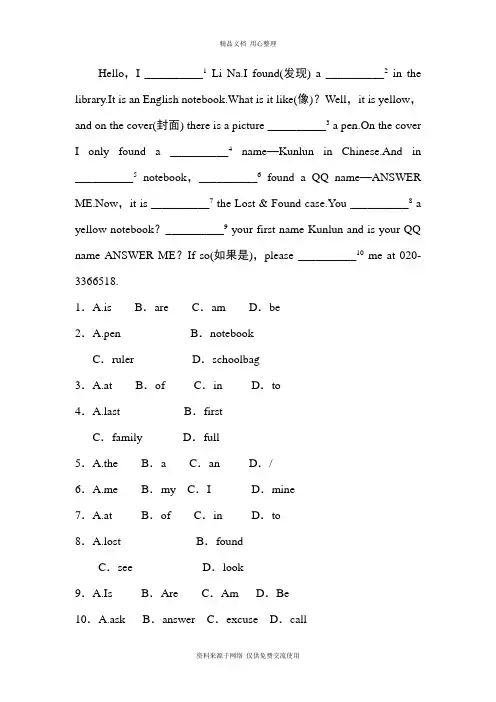
Hello,I __________1Li Na.I found(发现) a __________2in the library.It is an English notebook.What is it like(像)?Well,it is yellow,and on the cover(封面) there is a picture __________3 a pen.On the cover I only found a __________4name—Kunlun in Chinese.And in __________5notebook,__________6found a QQ name—ANSWER ME.Now,it is __________7 the Lost & Found case.You __________8 a yellow notebook?__________9 your first name Kunlun and is your QQ name ANSWER ME?If so(如果是),please __________10 me at 020-*******.1.A.is B.are C.am D.be2.A.pen B.notebookC.ruler D.schoolbag3.A.at B.of C.in D.to4.st B.firstC.family D.full5.A.the B.a C.an D./6.A.me B.my C.I D.mine7.A.at B.of C.in D.to8.A.lost B.foundC.see D.look9.A.Is B.Are C.Am D.Be10.A.ask B.answer C.excuse D.call答案1.C2.B点拨:用联系上下文法。
由下文可知是捡到了一个笔记本。
3.B点拨:用固定短语法。
a picture of ...“一张……的图片”。
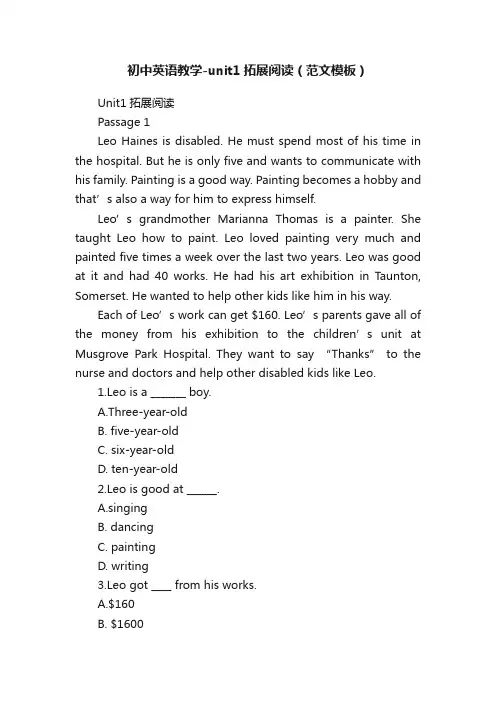
初中英语教学-unit1拓展阅读(范文模板)Unit1拓展阅读Passage 1Leo Haines is disabled. He must spend most of his time in the hospital. But he is only five and wants to communicate with his family. Painting is a good way. Painting becomes a hobby and that’s also a way for him to express himself.Leo’s grandmother Marianna Thomas is a painter. She taught Leo how to paint. Leo loved painting very much and painted five times a week over the last two years. Leo was good at it and had 40 works. He had his art exhibition in Taunton, Somerset. He wanted to help other kids like him in his way.Each of Leo’s work can get $160. Leo’s parents gave all of the money from his exhibition to the children’s unit at Musgrove P ark Hospital. They want to say “Thanks” to the nurse and doctors and help other disabled kids like Leo.1.Leo is a _______ boy.A.Three-year-oldB. five-year-oldC. six-year-oldD. ten-year-old2.Leo is good at ______.A.singingB. dancingC. paintingD. writing3.Leo got ____ from his works.A.$160B. $1600C. $2000D. $64004.Leo gave the money to _________.A.his grandmotherB. his grandfatherC. his parentsD. a hospital5.Which statement is right according to the passage?A.Leo was in hospital for three days.B.Leo learned painting from his grandmother.C.Leo didn’t want to see his doctors.D.Leo couldn’t see his family at all.Passage 2Disabled people can do many things wellI’m “disabled”: I can’t walk and I have to use a wheelchair to get around. However, I usually don’t like the word “can’t”. My parents always tell me to try to do things by myself. I can dress myself, get to school by myself, and take care of myself like other people. My parents work, so sometimes I even cook for my family at night. Many people think that because I can’t walk, I can’t do sports. But there are many sports I can do. And there are many competitions I can be in.My dream is to compete for China in the Paralympic games. People can compete in sports even if they can’t walk, can’t see, or can’t use their arms. There are many different sports for disabled athletes, like wheelchair basketball and wheelchair tennis.I can’t play those sports, but I can go very fast in my wheelchair. I want to compete against other people in wheelchairs and win for China! I’m too young to go to the 2008Olympics, but I think I can compete in 2012!1.Can the writer walk?__________________________2.How can the writer get around?_______________________________3.What can the writer do by himself or herself?____________________________________4.What is the writer’s dream?________________________5.What sports can disabled athletes do?_______________________________6.Can you use some adjectives to describe the writer?_________________________________________Passage 3J erry is a 55-year-old father of four children. He has a house and a large family. He stopped working as a computer programmer in 2009. Now he takes part in several sports and coaches people to play sports. In fact, Jerry has been disabled for over 37 years. On December 3, 1976, he was hit by a car. Then he had to sit in a wheelchair. Jerry’s life is not greatly influenced by his disability. He has a life just like any normal people do. “There are lots of things I can do, and there are some things I can’t do,” said Jerry. “I drive, and I spend my money. I’m not rich, but I’m not poor. I enjoy being healthy, and being independent.”Jerry likes doing things by himself. One day, when he was in line to buy a ticket, a worker walked to the line and asked people, “What do you need?” But when she saw Jerry and his wheelchair, she asked, “Who are you here with?” She didn’t believe he was there alone.Jerry has been a lot in over 37 years as a disabled person. Hehas been many of the difficulties disabled people are facing. But he has also seen many good changes. For example, with technological advances and the help of some volunteers, disabled people now can also play some outdoor sports. There are also organizations such as Lakeshore Foundation. It is a sport and research organization for disabled people. Jerry does a part-time job there –coaching disabled people to play basketball.Jerry said, “I don’t expect the world to travel around me. I will change myself just to adapt to the world.1.Jerry went to buy a ticket by himself because _____.A.his children were too busyB.it was difficult for normal people to buy the ticketsC.he didn’t get along well with his familyD.he wanted to be independent2.From the passage we can learn that Jerry ______.A.can’t drive a carB.was a teacher before 2009C.lives with his three childrenD.is good at playing basketball3.Which of the following is TRUE according to the passage?A.Jerry had an accident on December 3, 2009./doc/5c9873093.html,keshore Foundation is an organization for disabled people.C.Jerry often goes to sports games with his friends.D.Disabled people have no chances to play outdoor sports.4.The underlined words, “adapt to”, mean “_____” in Chinese.A.毁灭B. 说服C. 适应D. 拒绝5.What’s the passage mainly about?A.The story of Jerry living with disability.B.Jerry’s large family and hard life.C.Jerry’s special job and friends.D.Jerry’s hobbies and happy life.。
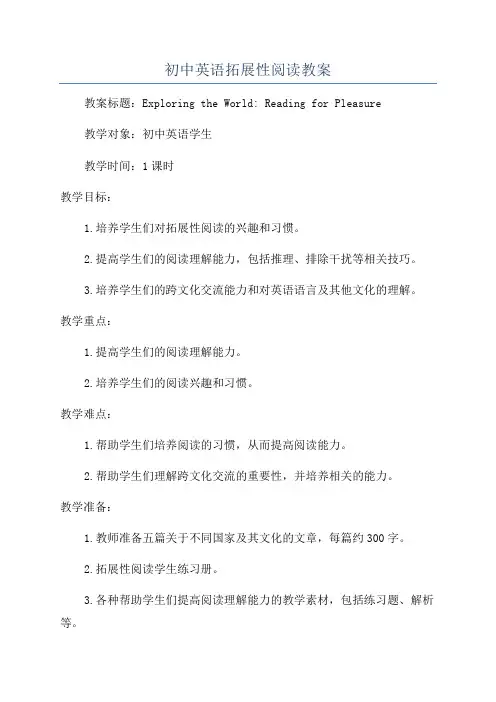
初中英语拓展性阅读教案教案标题:Exploring the World: Reading for Pleasure教学对象:初中英语学生教学时间:1课时教学目标:1.培养学生们对拓展性阅读的兴趣和习惯。
2.提高学生们的阅读理解能力,包括推理、排除干扰等相关技巧。
3.培养学生们的跨文化交流能力和对英语语言及其他文化的理解。
教学重点:1.提高学生们的阅读理解能力。
2.培养学生们的阅读兴趣和习惯。
教学难点:1.帮助学生们培养阅读的习惯,从而提高阅读能力。
2.帮助学生们理解跨文化交流的重要性,并培养相关的能力。
教学准备:1.教师准备五篇关于不同国家及其文化的文章,每篇约300字。
2.拓展性阅读学生练习册。
3.各种帮助学生们提高阅读理解能力的教学素材,包括练习题、解析等。
教学过程:Step 1:导入(5分钟)教师向学生们介绍拓展性阅读的重要性,以及如何培养拓展性阅读的习惯。
教师可以分享自己的阅读经历,如每天读一篇英语文章,并向学生们推荐一些优秀的英语读物。
Step 2:阅读文章(15分钟)教师将五篇关于不同国家及其文化的文章给学生们阅读。
学生们可以根据自己的阅读能力选择其中的一篇进行阅读。
Step 3:讨论与分享(10分钟)学生们在小组内讨论他们所读文章的主题、中心思想,以及他们所了解到的有趣的事实等。
教师可以引导学生们提出问题和交流,以促进其思考和表达能力的发展。
Step 4:阅读理解练习(15分钟)教师将一份阅读理解练习分发给学生。
学生们需要仔细阅读文后的问题,并根据文章内容选择正确答案。
教师在学生完成练习后,进行相关的解析和答疑。
Step 5:练习册完成(15分钟)学生们根据教师的要求,完成拓展性阅读练习册中的相关练习。
教师可以根据学生们的水平和能力情况,选择适当的练习题目进行布置。
Step 6:总结反馈(5分钟)教师与学生们一起总结当天的学习内容,提问学生们在拓展性阅读过程中所遇到的困难和收获。
并表扬和鼓励学生们的努力。
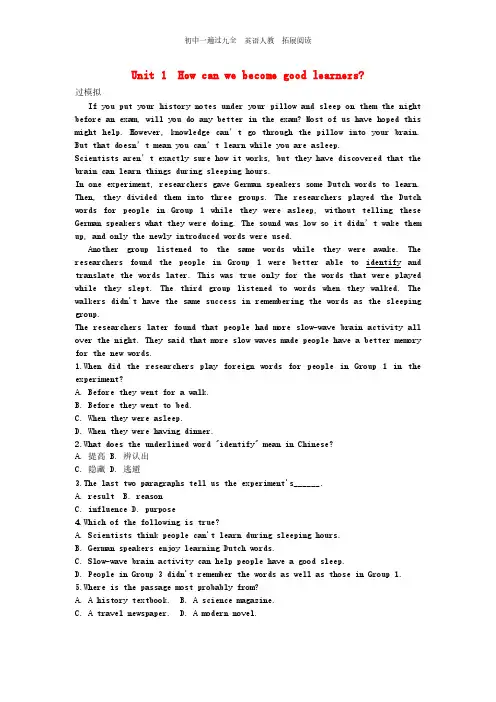
Unit 1 How can we become good learners?过模拟If you put your history notes under your pillow and sleep on them the night before an exam, will you do any better in the exam? Most of us have hoped this might help. However, knowledge can’t go through the pillow into your brain. But that doesn’t mean you can’t learn while you are asleep.Scientists aren’t exactly sure how it works, but they have discovered that the brain can learn things during sleeping hours.In one experiment, researchers gave German speakers some Dutch words to learn. Then, they divided them into three groups. The researchers played the Dutch words for people in Group 1 while they were asleep, without telling these German speakers what they were doing. The sound was low so it didn’t wake them up, and only the newly introduced words were used.Another group listened to the same words while they were awake. The researchers found the people in Group 1 were better able to identify and translate the words later. This was true only for the words that were played while they slept. The third group listened to words when they walked. The walkers didn't have the same success in remembering the words as the sleeping group.The researchers later found that people had more slow-wave brain activity all over the night. They said that more slow waves made people have a better memory for the new words.1.When did the researchers play foreign words for people in Group 1 in the experiment?A. Before they went for a walk.B. Before they went to bed.C. When they were asleep.D. When they were having dinner.2.What does the underlined word "identify" mean in Chinese?A. 提高B. 辨认出C. 隐藏D. 逃避3.The last two paragraphs tell us the experiment's______.A. resultB. reasonC. influenceD. purpose4.Which of the following is true?A. Scientists think people can't learn during sleeping hours.B. German speakers enjoy learning Dutch words.C. Slow-wave brain activity can help people have a good sleep.D. People in Group 3 didn't remember the words as well as those in Group 1.5.Where is the passage most probably from?A. A history textbook.B. A science magazine.C. A travel newspaper.D. A modern novel.答案解析【解题导语】人在睡觉的时候大脑也可以继续学习吗?看看本文是怎么说的吧。
初中英语拓展阅读(1)培训资料初中英语拓展阅读(1)APersonalities of some Chinese Birth SignsThe Rat (SHU)People born under the year of the Rat are generous and easygoing to those that they love and care for. They generally have happy and lively personalities and are very outgoing, although they lose their temper sometimes. On the whole they are successful in what they choose to do, full of imagination and have very good memories. The Rat is a lover of money and a hater of waste and idleness.The Rabbit (TU)People born under the year of the Rabbit don’t often get into trouble and seldom make enemies. They are considerate, kind and thoughtful towards others. The Rabbit is the symbol of a long life. They are said to draw their life energy from the moon. They like an easy and good time and give good advice, although they shy away from promises.The Dog (GOU)People born under the year of the Dog seem to be liked very well as it is one of the most popular animals. Dog people are truthful and clever, with a strong sense of fairness. They never avoid their duties. They always do their fair share of things and will alw ays “listen to reason”. They are helpful, open-minded, never envious, and have great insight into human nature. They are also brave and practical. However, if you try to look into their affairs, they can become secretive and also give a cold shoulder to th ose who they don’t really like.Choose the best answer for each question.( )1. People born under the year of the Rat _______.A. love money better than anything elseB. are hard-workingC. are good at choosing thingsD. think much but do little( )2. People born under the year of the Rabbit _______.A. don’t like to tell others what they thinkB. enjoy living a busy lifeC. often get on well with othersD. don’t believe others’ promises( )3. People born under the year of the Dog _______.A. like to do something secretlyB. are unhappy when others have done something betterC. often make excuses for their mistakesD. are good at seeing straight through others( )4. Which of the following is TRUE?A. Rat people can keep few things in mind.B. Rabbit people prefer the moon to the sun.C. Dog people like to look into others’ affairs.D. Dog people are willing to help others.( )5. What kind of people will not show their dissatisfaction to others?A. Rat people.B. Rabbit people.C. Dog people.D. All the above.Help: personality n. 个性generous adj. 慷慨的lose one’s temper 发脾气idleness n. 懒惰;闲散considerate adj. 考虑周到的shy away from 躲避;羞于listen to reason v. 服理envious adj. 嫉妒的insight n. 洞察力dissatisfaction n. 不满BIf you’re having difficulties in class and it seems that your teacher is unfair to you, take some time to think hard about what’s happening. Try to find out whether your teacher really dislikes you, or whether something else is going on. Here are some questions to ask yourself:1. Are you the only person being treated badly, or is your teacher rough on the whole class? Ask your classmates if they are having trouble with the teacher, too. If they say yes, perhaps your teacher is having problems outside the school, or is new and at a loss.2. Are you working up to your ability? Maybe you got a C in your last test, and your teacher told you that you could do better. But the kid sitting beside you got a C, too, and the teacher didn’t say anything to him! Isn’t this unfair? Well, it could be that your teacher knows that you could get a better grade if you put more effort into it. Teachers often grade students by different standards. It’s their way of encouraging a student to try a little harder.3. Are you more sensitive than other students? There’s nothing wrong with being sensitive, but if you react to criticism quite differently from others, this could be a reason why you think your teacher doesn’t like you.4. Does your teacher seem to act unfairly all the time, or just once in a while? Think about the harsh things your teacher has done or said to you. Are these things happening every day, or just once or twice a month? If your teacher really hates you, you would probably be picked on all the time. If your teacher hasacted unfairly only a few times, then there’s pro bably something else going on.If y ou take the time to ask yourself these questions, you’ll get a better sense of what’s happening between you and your teacher.Choose the best answer for each question.( )6. If you feel your teacher is unfair to you, you should _______.A. work harder at your lessonsB. care nothing for itC. ask your classmates for helpD. make it clear if this is true( )7. Which of the following is TRUE?A. Teachers are often rough on the students who get a C grade.B. If a teacher hates you, he will criticize you once or twice a month.C. A new teacher is often rough on the whole class.D. Sometimes your teacher criticizes you to make you work harder.( )8. If you find your teacher only treats you badly all the time, maybe _______.A. he has problems outside the schoolB. he really dislikes youC. he is more sensitive than other teachersD. he is new and wants to have some experience( )9. What does the underlined word “it” in the third paragraph mean?A. Your ability.B. A C grade.C. Your study.D. Your teacher.( )10. What’s the best title for this passage?A. Is your teacher really unfair to you?B. How to get on with your teachersC. Know more about your teachers!D. How to get a better sense in schoolHelp: rough adj. 粗暴的at a loss 不知所措standard n. 标准sensitive adj. 敏感的react v. 反应criticism n. 批评harsh adj. 苛刻的pick on 故意刁难;挑剔CWhat will you do to make sure you reach your goals? There are three main steps to get to where you want to go.First, sit down and write your dreams out. By writing them you will get a better idea of where you really want to go. Imagine yourself at the end of the year or maybe in five years. What do you see? How do people see you? What are you doing? Are you successful?Well, a dream is just that. It’s a vision of how you see yourself in the future. Once you know the direction in which you want to go, you can begin working on some goals.Secon d come the goals. Goals are “wants”. So are dreams, but goals are more specific. If you want to be rich, tell how much money you need to be rich. If you want good grades, tell what you mean by “good”. In fact, the more specific the goal is, the easier it w ill be to get it. Give numbers and times. Don’t use words like “lots” or “more”. For example, I want a “B” in each of my subjects.Third are the objectives. They tell exactly what you will doand when you will do it. When you think about what you will do, don’t use words like “try” or “maybe”. Be sure your objectives can be measured. Every day or every week you can say, “Did I do this?” and you can answer with either a yes or a no. Don’t leave room for “maybes”.OK. Here is another example. I say I want a “B” in each subject. My objectives are:I will go to every class every day.I will sit in the middle of the classroom.I will re-read my notes from every class every day.I will finish every assignment the day when it is given.Well, you get the idea. Each of my objectives is specific and each one can be measured. If Ido all these things, there is a pretty good chance for me to get what I want, which means I’ll fulfill my dream.Fill in the blanks with proper words according to the passage.11. The writer advises you to write your _______ out so that you can get a better idea of where you really want to go.12. Dreams are not so _______ as goals.13. _______ tell exactly what to do and when to do it.14. “I want to learn more English in the future” is a dream, while “I want to go to the English Department of Wuhan University” is a _______.15. Most of the objectives should be fulfilled every _______ according to the second example. Help: vision n. 想象;幻想specific adj. 详细的;明确的objective n. (客观的)目标measure v. 测量;估量assignment n. 任务;作业fulfill v. 实现Key: 1-5 BCDDB 6-10 DDBCA11. dreams 12. specific 13. Objectives 14. goal 15. day 一年级《国学经典》知识竞赛题班级:姓名:成绩:一、填空题:(每空0.5分,共20分)1、()苍苍,野茫茫,()吹()低()牛羊。
初中英语阅读教案:提升学生阅读能力的关键步骤引言阅读是学习语言的重要组成部分,也是提高英语水平的关键能力之一。
尤其对于初中生而言,掌握好阅读技巧对于他们日后的学习和考试都至关重要。
然而,许多初中生在英语阅读方面存在一定的困扰和挑战。
本篇文章将介绍一些拓展阅读素材来帮助初中生提高阅读能力的教案,希望能够对英语教师和学生有所帮助。
拓展阅读的意义拓展阅读是指通过提供额外的阅读材料来帮助学生拓宽词汇量、理解能力和阅读技巧。
相比于课本中的简单阅读材料,拓展阅读更注重学生的思维和表达,培养学生独立阅读的能力。
拓展阅读不仅可以提高学生的阅读理解能力,还能增加他们对英语文化的了解,培养学生的阅读兴趣。
设计教案的关键步骤步骤一:选择合适的阅读材料选择合适的阅读材料是设计教案的第一步。
教师应根据学生的年龄、兴趣、英语水平等因素来选择适合的材料。
例如,可以选择一些与学生生活相关的话题,或者是经典的英语短篇故事。
此外,材料的难易程度也需要考虑到学生的实际水平,以便他们能够顺利理解和掌握。
步骤二:引导学生进行预备阅读在学生阅读材料之前,教师可以引导学生进行预备阅读。
这包括先让学生快速浏览文章,了解文章的主题、结构和段落的组织方式。
同时,教师可以提前指导学生阅读时应注意的关键词汇、短语及语法结构。
这样有助于学生在阅读时更有针对性地寻找信息和理解文章的内容。
步骤三:开展细读和理解训练学生开始进行细读时,教师可以采用一些有效的训练方法来帮助学生提高阅读理解能力。
例如,教师可以设计一些问题,并让学生根据文章回答问题。
这样可以培养学生对文章的整体理解能力和细节把握能力。
同时,教师还可以引导学生使用一些阅读技巧,比如猜测词义、寻找上下文线索等,来帮助他们更好地理解文章。
步骤四:进行语言输出和表达训练阅读不仅是理解文章,更是学习语言的过程。
因此,在阅读教案中,教师应注重学生的语言输出和表达能力训练。
教师可以要求学生用自己的话复述文章的主要内容,或者写一篇与文章相关的短文。
Music in SchoolsCan you play a musical instrument? Where did you learn to play it? If you were a pupil in a British school, you would most probably learn at school. Approximately 25% of British pupils learn an instrument. What's more, of the 75% that don't, 40% would like to.But what instruments do the pupils learn to play? Traditionally, school chi ldren learnt classical instruments, such as the piano or violin. This is still true today. Younger children often learn the recorder. As they get older, they start to play the violin or piano. In fact, nearly one out of five music studentsis learning the violin. The piano, or keyboard, is more popular with older children at secondary school.However, things are changing. More pupils than ever before are now lear ning the guitar. As many as 16% of pupils learning an instrument are strumming(漫不经心地弹奏) its strings(弦). Paul McManus, the Chief Executive of the Music Industries Association told the Telegraph(电讯报) newspaper that new British bands like Franz Ferdinand(法兰兹·费迪南), the Arctic Monkeys(北极猴子乐队) and Razorlight (激光乐团) had made playing the guitar 'cool' again. This, perhaps, is why more children are now learning the guitar.British schools do not just offer lessons for instruments. All pupils learn music together as a class. These classes have been changing, too. In the past, the focus of classes was very much Western classical music. But the classes nowcover a far wider range of styles, including folk music and world music. In a recent study by Keele University, 64% of boys and 70% of girls said they enjoy music lessons as a class. They like singing, playing instru- ments and find the lessons fun. Many schools have orchestras and put on concerts each term. It is also common for pupils themselves to form their own bands, copying their rock and pop heroes.In conclusion, music plays a big part in British schools. Pupils can study an instrument, play music together as a class and even take part in concerts and plays.。
《初中英语拓展阅读》BREAKAWAY 1听力部分录音稿Unit 1 ListeningKent takes our dog Rocco for a walk every morning. Rocco is always happy to see Kent. Kent picks him up at seven o’clock and brings him back at eight thirty. Rocco has a great time. He loves walks on the beach best.Unit 2 ListeningI called an ambulance once – for my son Ben, when he was four years old. Ben was climbing a tree and he fell and cut his arm. There was a lot of blood, and I didn’t know what to do. So I called for an ambulance. It came quickly – in about ten minutes. The two paramedics talked to Ben and checked his arm. They cleaned it and put a bandage on it. We were lucky –Ben didn’t have to go to hospital. Those two paramedics did a great job. Unit 3 ListeningI’m tired this morning because I didn’t get much sleep. I finished work at three o’clock in the morning! We’re really busy at work because we’re helping to create a new game. It’s a racing game, with lots of cars racing through a city. It’s going to be a really exciting game, but right now we’re testing it and we’ve found some bugs. That’s good, because that’s what the company pays us to do. We work long hours. They don’t want us to stop working through the night, so they give us pizza to eat. That’s one part of the job that I like!Unit 4 ListeningHi. I’m Simon, and I’m one of the trainee chefs here at Green Garden Restaurant. We’re busy this afternoon. Lunch is finished, but now we’re getting ready for dinner. At the moment I’m making bread. I’ll put it in the oven soon, and then I’l l go and help Jackie. She’s chopping vegetables. And Peter is preparing the fish. We’ve got a lot of people coming for dinner at six o’clock, so we’ve got a lot to do!Unit 5 ListeningI’ve been working hard here for the last two weeks and now I’m waiting for the helicopter to come and take me back to land. I ha ve two weeks off. I’m looking forward to seeing my wife and my family. During my time off I usually just relax. I’ll do things like taking my dog for walks along the beach. And I play football. I’m playing a game this Saturday. You can’t do things like that on an oil platform. Oh, and I help my wife around the house, of course! Then in two weeks’ time I’ll be back here to start work again.We were on a holiday in Zambia in Africa, and we went on a boat trip down a river. There were lots of birds to see in the trees beside the river and we were having a nice time. Then someone shouted, ‘Look –hippos!’ There were about twenty hippos ahead of us. Some of them were in the water and some were beside the river in the mud. One of the hippos went under the water, and then about two minutes later it came up very closeto our boat. It was amazing! I was glad that it didn’t attack us!Unit 7 ListeningWe went fishing on the Kenai River in Ala ska in July. It’s a good time for fishing because a lot of salmon are migrating up the river then. We went out in the river in a boat and put our lines in the water. We caught lots of salmon that day. Some of them were really big and heavy! We didn’t keep them all. We put some of them back into the water. But we did eat salmon for dinner all that week!Unit 8 ListeningWhen my family were on holiday in the south of France we went to the Camargue. We love birds and we wanted to see the pink flamingos that live there. One day we went horseback riding. We rode Camargue horses. They’re quite small and they’re a light gr ay color. We rode along the beach, and then we rode beside some shallow lakes. And that’s where we saw the flamingos. There were thousands of them. I took some great photos. There was just one thing we didn’t like –getting bitten by mosquitoes! But that didn’t stop us from enjoying the day.Unit 9 ListeningI saw a leafy sea dragon when I was diving at Rapid Bay in South Australia. The water was about 5 meters deep. There was a lot of seaweed and sea grass at the bottom. At first I didn’t see the leafy sea dragon. I thought I was looking at seaweed. Then it moved, and I realized what I was looking at. It was a leafy sea dragon! I followed it and watched itfor about fifteen minutes. They’re amazing-looking fish. They swim slowly and they really do look just like seaweed. They’re so beautiful.Unit 10 ListeningSome people ask me what my dogs eat during the Iditarod race. They eat meat, and sometimes fish, and also a special dog food. They need to eat a lot because they run for so many hours each day. They eat a lot more than I do! We can’t carry all the food with us. Before the race the mushers put food into bags. We have to put our names on the bags. Then the bags are sent out to the places where we’re going to stop in the race to rest. So during the race, when we arrive at a rest stop, the food is waiting for us.Unit 11 ListeningOkay, Alec. I hope you have practiced your clarinet this week. You know it is very important to practice every week. You should practice your clarinet three times a week. You should play for 30 minutes each time. First you should play some simple music. Then you should play some of your more difficult music. Okay, let’s begin…Max and I made a glass orchestra. It was fun. We used red, yellow, green and blue food coloring. We tried to play some simple tunes on our glass orchestra. I played Happy Birthday and Max played Twinkle, Twinkle Little Star.Unit 13 ListeningI went to Inner City Rock School for a week in my school holidays. It was amazing! I learned how to sing in a rock band. I joined a rock band called Stomp. We wrote two great songs. We played our songs on stage at the concert. I sang both songs. I loved it. I really made my dream come true.Unit 14 ListeningPlaying a flute is not easy. There is a hole at one end of the flute. You put your mouth over the hole. Then you blow gently across the hole. It can be difficult to make a sound. You may need to practice a lot.Unit 15 ListeningI listen to music all the time. Music makes me feel happy! Sometimes I listen to music in my room and dance. I also listen to music when I am doing my homework. I listen to music when I go to bed at night. But my dad always comes into my room and tells me to go to sleep.Unit 16 ListeningI climbed an active volcano in Guatemala last year. At first it was okay. I was with a group of five other tourists. We didn’t think it was dangerous. We could see smoke comin g out of the volcano but we weren’t worried. But then someone at the front of the group started to shout. They could see that the volcano was erupting. Suddenly there was lava coming down the volcano toward us! We turned around and ran as fast as we could. It was so frightening!Unit 17 ListeningWe went to the Maldives for a holiday. We flew in to Malé, the capital city, but we didn’t stay there. We went to a small island and stayed there for a week. It was a really beautiful place. It had beautiful beaches with white sand. Most days the weather was very good, so we could go swimming. But one day there was a storm, with strong winds and big waves. The water came up over the beach. The next morning, a lot of the beach was washed away. The people of the isla nd say that happens a lot. It’s a real problem for them.Unit 18 ListeningI’ve just come back from New Zealand. I had a great holiday there with my husband and two children. We went to the North Island and the South Island. The two islands are quite different. We saw lots of animals like whales, seals and kiwis. I bought some beautiful woodcarvings. My daughter bought some nice stone jewelry. We really had a good time in New Zealand.I went to Russia on holiday last year. It was fantastic. It is such a beautiful country. I went in winter so it was very, very cold. I went to Siberia. It was so cold that I could only stay outside for a few minutes. I also went to Lake Baikal. It is very famous because it is the deepest lake in the world. It is a very beautiful lake. I saw a Siberian tiger – they are very rare. I saw it in the zoo, though! There are not many left in the wild.Unit 20 ListeningI’m going to Monaco for the first time next May. I’m very excited about it! I’m going to watch th e Grand Prix. I’m going with my brother, John. We love car races. We are going to stay for two weeks. As well as watching the Grand Prix, we’re also going to visit the beaches. Monaco has some beautiful beaches. We’re not going to visit the casino though.I don’t want to spend lots of money in the casino!。
初中英语拓展阅读(1)APersonalities of some Chinese Birth SignsThe Rat (SHU)People born under the year of the Rat are generous and easygoing to those that they love and care for. They generally have happy and lively personalities and are very outgoing, although they lose their temper sometimes. On the whole they are successful in what they choose to do, full of imagination and have very good memories. The Rat is a lover of money and a hater of waste and idleness.The Rabbit (TU)People born under the year of the Rabbit don’t often get into trouble and seldom make enemies. They are considerate, kind and thoughtful towards others. The Rabbit is the symbol of a long life. They are said to draw their life energy from the moon. They like an easy and good time and give good advice, although they shy away from promises.The Dog (GOU)People born under the year of the Dog seem to be liked very well as it is one of the most popular animals. Dog people are truthful and clever, with a strong sense of fairness. They never avoid their duties. They always do their fair share of things and will always “listen to reason”. They are helpful, open-minded, never envious, and have great insight into human nature. They are also brave and practical. However, if you try to look into their affairs, they can become secretive and also give a cold shoulder to those who they don’t really like.Choose the best answer for each question.( )1. People born under the year of the Rat _______.A. love money better than anything elseB. are hard-workingC. are good at choosing thingsD. think much but do little( )2. People born under the year of the Rabbit _______.A. don’t like to tell others what they thinkB. enjoy living a busy lifeC. often get on well with othersD. don’t believe others’ promises( )3. People born under the year of the Dog _______.A. like to do something secretlyB. are unhappy when others have done something betterC. often make excuses for their mistakesD. are good at seeing straight through others( )4. Which of the following is TRUE?A. Rat people can keep few things in mind.B. Rabbit people prefer the moon to the sun.C. Dog people like to look into others’ affairs.D. Dog people are willing to help others.( )5. What kind of people will not show their dissatisfaction to others?A. Rat people.B. Rabbit people.C. Dog people.D. All the above.Help: personality n. 个性generous adj. 慷慨的lose one’s temper 发脾气idleness n. 懒惰;闲散considerate adj. 考虑周到的shy away from 躲避;羞于listen to reason v. 服理envious adj. 嫉妒的insight n. 洞察力dissatisfaction n. 不满BIf you’re having difficulties in class and it seems that your teacher is unfair to you, take some time to think hard about what’s happening. Try to find out whether your teacher really dislikes you, or whether something else is going on. Here are some questions to ask yourself:1. Are you the only person being treated badly, or is your teacher rough on the whole class? Ask your classmates if they are having trouble with the teacher, too. If they say yes, perhaps your teacher is having problems outside the school, or is new and at a loss.2. Are you working up to your ability? Maybe you got a C in your last test, and your teacher told you that you could do better. But the kid sitting beside you got a C, too, and the teacher didn’t say anything to him! Isn’t this unfair? Well, it could be that your teacher knows that you could get a better grade if you put more effort into it. Teachers often grade students by different standards. It’s their way of encouraging a student to try a little harder.3. Are you more sensitive than other students? There’s nothing wrong with being sensitive, but if you react to criticism quite differently from others, this could be a reason why you think your teacher doesn’t like you.4. Does your teacher seem to act unfairly all the time, or just once in a while? Think about the harsh things your teacher has done or said to you. Are these things happening every day, or just once or twice a month? If your teacher really hates you, you would probably be picked on all the time. If your teacher has acted unfairly only a few times, then there’s probably something else going on.If y ou take the time to ask yourself these questions, you’ll get a better sense of what’s happening between you and your teacher.Choose the best answer for each question.( )6. If you feel your teacher is unfair to you, you should _______.A. work harder at your lessonsB. care nothing for itC. ask your classmates for helpD. make it clear if this is true( )7. Which of the following is TRUE?A. Teachers are often rough on the students who get a C grade.B. If a teacher hates you, he will criticize you once or twice a month.C. A new teacher is often rough on the whole class.D. Sometimes your teacher criticizes you to make you work harder.( )8. If you find your teacher only treats you badly all the time, maybe _______.A. he has problems outside the schoolB. he really dislikes youC. he is more sensitive than other teachersD. he is new and wants to have some experience( )9. What does the underlined word “it” in the third paragraph mean?A. Your ability.B. A C grade.C. Your study.D. Your teacher.( )10. What’s the best title for this passage?A. Is your teacher really unfair to you?B. How to get on with your teachersC. Know more about your teachers!D. How to get a better sense in schoolHelp: rough adj. 粗暴的at a loss 不知所措standard n. 标准sensitive adj. 敏感的react v. 反应criticism n. 批评harsh adj. 苛刻的pick on 故意刁难;挑剔CWhat will you do to make sure you reach your goals? There are three main steps to get to where you want to go.First, sit down and write your dreams out. By writing them you will get a better idea of where you really want to go. Imagine yourself at the end of the year or maybe in five years. What do you see? How do people see you? What are you doing? Are you successful?Well, a dream is just that. It’s a vision of how you see yourself in the future. Once you know the direction in which you want to go, you can begin working on some goals.Secon d come the goals. Goals are “wants”. So are dreams, but goals are more specific. If you want to be rich, tell how much money you need to be rich. If you want good grades, tell what you mean by “good”. In fact, the more specific the goal is, the easier it w ill be to get it. Give numbers and times. Don’t use words like “lots” or “more”. For example, I want a “B” in each of my subjects.Third are the objectives. They tell exactly what you will do and when you will do it. When you think about what you will do, don’t use words like “try” or “maybe”. Be sure your objectives can be measured. Every day or every week you can say, “Did I do this?” and you can answer with either a yes or a no. Don’t leave room for “maybes”.OK. Here is another example. I say I want a “B” in each subject. My objectives are:I will go to every class every day.I will sit in the middle of the classroom.I will re-read my notes from every class every day.I will finish every assignment the day when it is given.Well, you get the idea. Each of my objectives is specific and each one can be measured. If Ido all these things, there is a pretty good chance for me to get what I want, which means I’ll fulfill my dream.Fill in the blanks with proper words according to the passage.11. The writer advises you to write your _______ out so that you can get a better idea of where you really want to go.12. Dreams are not so _______ as goals.13. _______ tell exactly what to do and when to do it.14. “I want to learn more English in the future” is a dream, while “I want to go to the English Department of Wuhan University” is a _______.15. Most of the objectives should be fulfilled every _______ according to the second example. Help: vision n. 想象;幻想specific adj. 详细的;明确的objective n. (客观的)目标measure v. 测量;估量assignment n. 任务;作业fulfill v. 实现Key: 1-5 BCDDB 6-10 DDBCA11. dreams 12. specific 13. Objectives 14. goal 15. day 一年级《国学经典》知识竞赛题班级:姓名:成绩:一、填空题:(每空0.5分,共20分)1、()苍苍,野茫茫,()吹()低()牛羊。